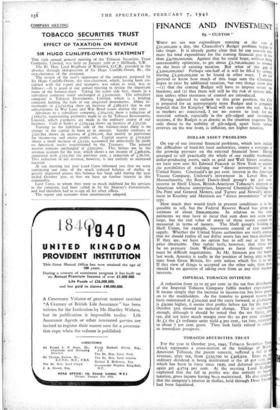FINANCE AND INVESTMENT
By " CUSTOS
WHEN we see war expenditure running at the rate of Li i,000,000 a day, the Chancellor's Budget problem begins to take shape. It is already pretty clear that he can scarcely esti. mate his total expenditure for the coming financial year at less than £4,700,000,000. Against that he could hope, without being unreasonably optimistic, to get about £1,700,000,000 in revenue on the basis of existing taxation. But what of the gap of £3,000,000,000? Perhaps one-half of it will be: filled by savings, leaving £1,500,000,000 to be found in other ways. I do not pretend to know how much of this huge sum the Chancellor hopes to raise by additional taxation, but two things seem clear —(t) that the coming Budget will have to impose severe tai burdens; and (2) that there will still be the risk of serious infla- tion unless other measures of control are introduced.
Having adjusted its outlook to this grim position, the City is prepared for an appropriately stern Budget and is genuinely hopeful that Sir Kingsley Wood will not spare the rod. So far as markets are copceined, I see no reason to look for any material setback, especially in the gilt-edged and investment sections, if the Budget is as drastic as the situation requires. The only threat to the stability of gilt-edged, apart from serious reverses on the war front, is inflation, not higher taxation.
DOLLAR ASSET PROBLEMS
On top of our internal financial problems, which now include the difficulties of hard-hit local authorities, comes a reminder of the growing pressure on the external financial front. Having arranged to sell practically the whole of our readily marketable dollar-producing assets, such as gold and Wall Street securities, we have now sent Sir Edward Peacock to New York to explore the possibilities of realising our " direct investments " in the United States. Courtauld's 90 per cent. interest in the American Viscose Company, Unilever's investment in Lever Bros. of Massachusetts, the Royal Dutch-Shell group's 6o per cent interest in Shell Union, British-American Tobacco's interests in American tobacco enterprises, Imperial Chemical's holdings in Du Pont and General Motors, and Turner and Newall's invest. ment in Keasbey and Mattison are " direct investments " of this type.
How much they would fetch in present conditions it is im- possible to tell, but the Federal Reserve Board has given an estimate of about $90o,000,000. In relation to the com- mitments we may have to incur that sum does not seem very large, but the real value of many of these assets cannot be measured in terms of money. The Shell group's holding in Shell Union, for example, represents control of raw material supply. Whether the United States authorities are really anxious that we should realise all our dollar assets has not been disclosed. If they are, we have no option but to sell out at the best price obtainable. One rather feels, however, that there will be no pressure from -Washington to force through what must be difficult negotiations. As Mr. Stimson put the mane( last week, America is really in the 'position of being able to buy time from Great Britain, the only nation which has it to sell If this view of things is accepted on the other side, then there should be no question of taking over from us any vital business interests.
IMPERIAL TOBACCO DIVIDEND
A reduction from 23 to 20 per cent. in the tax free distribution of the Imperial Tobacco Company fulfils market expectations It means simply that the increase in income-tax has been passed on to the stockholders. As the transfer to general reserve has been maintained at £5oo,00o and the carry forward, at £1,621, is £9,00o higher, it seems that profits before tax for the year October 31st showed no material change. That is satisfactol enough, although it should be noted that the net figure, of tax, did not leave much margin over the 20 per cent. divider At £5 the £a ordinary units yield 4 per cent., tax free, equivalent. to about 7 per cent. gross. They look fairly valued in relatioa to immediate prospects.
TOBACCO SECURITIES TRUST
For the year to October 31st, 1940, Tobacco Securities Tru-,.. which represents a cross-section of the holdings of Brit.:. American Tobacco, the parent concern, suffered a fall In revenue, after tax, from £535,700 to £498,910. Even so, In ordinary dividend is being maintained at the 16 per cent. ,m which has been in force since 1936, and deferred stockho.d again get 4.5714 per cent. At the meeting Lord Bradbu. explained that the fall in profits was due entirely to hea, taxation, gross income having been maintained. He also disc °' that the company's. interest in shellac, held through Dean Fin had been liquidited.






























 Previous page
Previous page